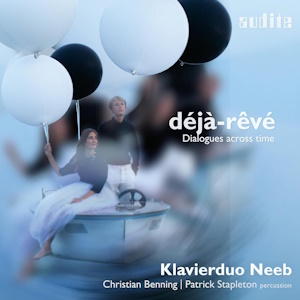
Déjà-rêvé – Dialogues across time
Claude Debussy (1862-1918)
Jeux (1912) (arranged for two pianos and percussion by Johannes X. Schachtner)
Wolfgang Amadeus Mozart (1756-1791)
Piano Concerto no. 21 in C major, K. 467 – i. Allegro (1785, arranged for two pianos by Klavierduo Neeb)
Johannes X. Schachtner (b. 1985)
Bach.Choral.Exerzitien, for two pianos and percussion (2022)
Bernd Alois Zimmermann (1918-1970)
Monologues for two pianos (1964)
Klavierduo Neeb (pianos)
Christian Benning, Patrick Stapleton (percussion)
rec. 2022, Sendesaal Bremen, Germany
Reviewed as a download from a press preview
Audite 97.813 [72]
The debut recording of the Klavierduo Neeb offers a varied and intriguing program of works for two pianos, with and without added percussion. There is much to enjoy in these performances by siblings Vincent and Sophie Neeb, though the unifying idea—the tracing of musical dialogues backwards and forwards across time—works better as an abstract exercise than as a principle of program design.
Bernd Alois Zimmermann’s Monologe (Monologues) for two pianos, from 1964, serves as the focal point for such connections. Zimmermann, a key figure in the German avant-garde of the 1950s and 1960s, was attentive to his musical past, and the mixing and layering of diverse musical materials was a frequent element of his musical style. Monologues, in five sections of different lengths running to approximately 18 minutes in total, is characterized by atmospheric effects, frenetic bursts of energy, extreme registral shifts, all of which requires virtuosic musical coordination between the two pianists. Out of this modernist complexity emerge recognizable musical ‘memories’ or quotations. Bach’s ‘Wachet auf, ruft uns die Stimme’ and ‘Vater unser im Himmelreich’ combine with melodies from Messiaen’s L’Ascension. Atmospheric snippets of Debussy’s ‘Feux d’artifice’, from his second book of Préludes, and his ballet Jeux slide in and out of view. Bits of Mozart and Beethoven figuration appear, reminiscent perhaps of years of keyboard training. The effect is not of pastiche. Zimmermann is suggesting that our past musical experiences remain with us even as we generate new ones, an idea that is very much of the present; composers of our time comfortably draw on music of all styles and all of music history as source material.
The performance of Monologues is generally brisk and straightforward, well-played by Klavierduo Neeb. The players effectively convey the feeling of memories emerging from a distance (‘wie aus der Ferne’ as the Dutchman sings in Der fliegende Holländer). The gold-standard performance remains the 1979 recording by Alfons and Aloys Kontarsky, the dedicatees to whom Zimmermann’s musical language comes utterly naturally, still available as a download (DG). I’m also particularly fond of Huber and Thomet (2013, Wergo WER 68092), whose more relaxed traversal is loving and cogent. Several other performances have much to offer as well. In this impressive company of duo-pianists, the Klavierduo Neeb more than hold their own.
To explore the idea of musical dialogues moving back and forth across time, Klavierduo Neeb has chosen some of the works quoted in the Zimmermann, and has subjected them to further arrangement. In two of these works, the Neebs are joined by two excellent percussionists, Christian Benning and Patrick Stapleton.
I’m quite impressed with Johannes X. Schachtner’s homage to Bach (and to György Kurtág’s four-hand transcriptions of Bach) entitled Bach.Choral.Exerzitien, arrangements of seven of Bach’s chorale preludes for two pianos and percussion, including both ‘Wachet auf’ and ‘Vater unser im Himmelreich’. The composer exhibits a striking variety of arrangement techniques, and a lovely ear for sonority and timbral effect, and the performance is first-rate. The worklist on Schachtner’s website suggests that he, like Zimmermann, is attentive to music of the past, as well as prolific.
Another arrangement by Schachtner for two pianos and percussion opens the disc: Debussy’s ballet Jeux, which the composer called a ‘poème dansé’. Again, the arrangement for these forces is attractive, with lovely sonorities. Compared to Jean-Efflam Bavouzet’s arrangement of Jeux for two pianos alone, which is tremendously effective, the added percussion does little to propel the flighty, improvisatory narrative. Indeed, the synchronization of four players here results in an overly cautious and rhythmically rigid performance, a Jeux with less momentum and shape than (in Bavouzet’s arrangement) as recorded by Bavouzet and François-Frédéric Guy on a lovely disc of two-piano arrangements (Chandos CHAN 10853), or Vladimir and Vovka Ashkenazy in two-piano works by Debussy and Ravel (Decca 478 1090) (review).
The final work on the disc is the first movement of Mozart’s C-major piano concerto, K. 467, arranged brilliantly for two pianos by the Neebs. Snippets of this movement appear in Zimmermann’s Monologues, though that connection is tenuous. All of the orchestral and solo material is present; the solo passages have been filled out with playful counterpoint and filigree, giving this the feeling of a double concerto, and the movement culminates in a lively cadenza. This is joyous playing, perhaps lacking only the last degree of flexibility.
The digital download adds a bonus track not on the physical CD: another Bach-inspired composition by Schachtner, entitled SuperInvention. Invention No. 6 for Two Pianos and Percussion, which also communes with Saint-Saëns and Strauss along the way. Quite delightful.
The recorded sound by Audite is excellent, and the presentation is very attractive. The program is nicely varied, with the piano-plus-percussion arrangements sitting comfortably alongside the Zimmermann; if the Mozart is more of an outlier, that surely doesn’t matter much. I look forward to the next offering from this talented piano duo.
Jeffrey Hollander
Help us financially by purchasing from



















